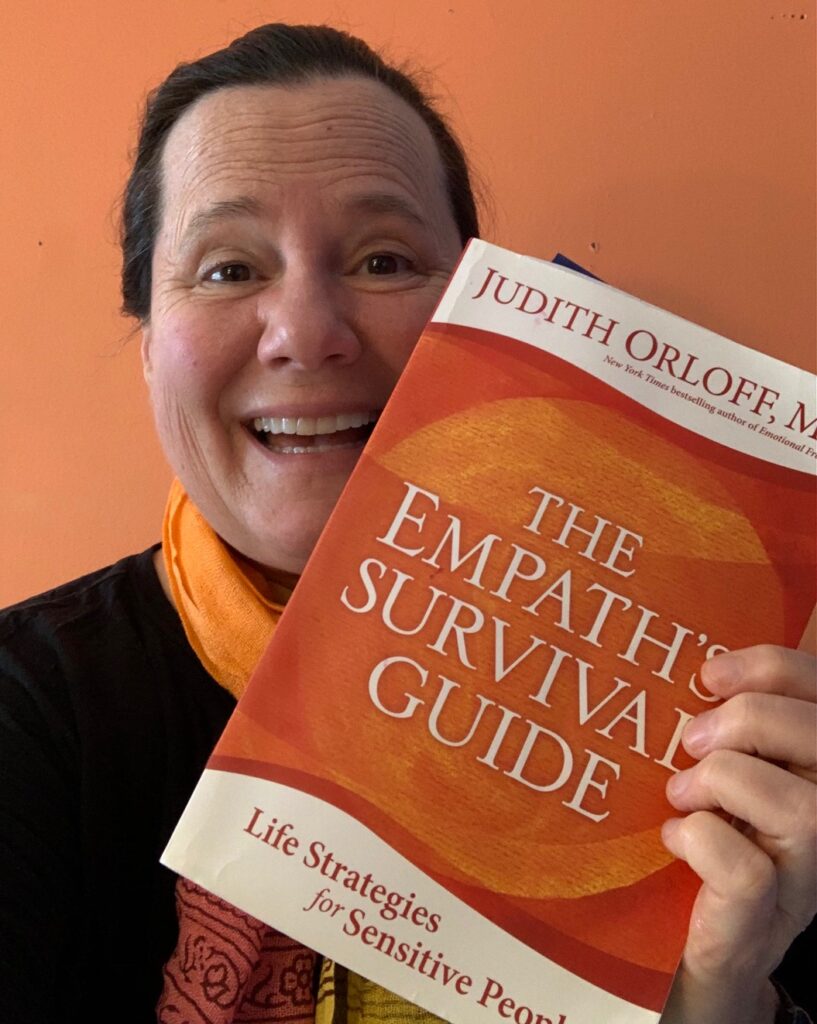Do you have a Little Free Library in your neighborhood? Here in Minneapolis, Minnesota people are very fond of them. As a result, on any walk I do with Sam, I take a peek at the various Little Free Libraries as we stroll. I regularly contribute to them as well. They remind me of the importance of sharing with your neighbors. Plus, reading is fun!

A little over a month ago, I found a title that caught my eye, The Empath’s Survival Guide: Life Strategies for Sensitive People by Judith Orloff, MD. It took me a few weeks to start reading it, but once I dove in I was astonished. I’ve suspected I was an empath, but I wasn’t exactly sure what one was and never had confirmation.
Turns out, lots of us are empaths. In fact, about 20% of the population are empaths, men and women. To quote Dr. Orloff’s book, page 2, here’s how she describes empaths:
Empaths have an extremely reactive neurological system. We don’t have the same filters that other people do to block out stimulation. As a consequence, we absorb into our own bodies both the positive and stressful energies around us. We are so sensitive that it’s like holding something in a hand that has fifty fingers instead of five. We are truly “super responders.”
I read her book cover to cover in record time and if you suspect you might be an empath or you know someone who is, please get this book. On her website and in the book, she has an empath self assessment you can take to determine if you are an empath.
The assessment asks twenty questions that you answer “mostly yes” or “mostly no” to each question. I answered a resounding 17 “MOSTLY YES-es!” If you answer yes to more than 15 questions, you are considered a full-blown empath. Getting that result was very affirming.
One of the most amazing things about the book is how Dr. Orloff, herself an empath, describes protection strategies that we can use to keep ourselves calm, centered and grounded. Many of the strategies are things I’ve learned for survival over the years.
For example, I often visualize a field of light around my body. I also take long showers as I imagine the water washing over my body washing off the energy of others that clings to my body. It’s true, I had no idea that feeling the energy of others in my body is a clear sign of being an empath.
Another clear sign of being an empath is how often in my life people end up telling me their deepest stories, often without me even asking.
Reading deeper into this book, I had another MAJOR a-ha moment. I have had wonderful romantic relationships with men over my lifetime, but one of my biggest challenges has been sleeping in the same bed as my partner. I simultaneously love and hate sharing the bed for the night. I adore the coziness of sharing the bed and I hate the energetic disruption of being that close to another person’s energy all night.
As a result, many times I had to leave our shared bed and go sleep on the couch or another bed in the house. I never had language to describe why I couldn’t stay in the bed the whole night. All I knew was that the energy of the other person totally disrupted my ability to calm my own body enough to fall asleep. Explaining that inside my head made me feel like I must be a total nutcase. As a result, I blamed it on myself, saying I just had a hard time falling asleep.
In fact, this inability to sleep the whole night with my partner is one of the biggest reasons I have resisted getting into a long term, serious romantic relationship. Reading Chapter 4: Empaths, Love and Sex in The Empath’s Survival Guide was like throwing a light on in a very dark room. I took another self-assessment in this chapter and yes indeed, I am a relationship empath. As a result, Dr. Orloff advises me and those like me to “learn skills to manage my sensitivities in order to have a successful relationship.”
I feel like I have a clear path ahead. In my Vision Board, the first item in the LOVE category on my 2021 Goals and Resolution list is:
Keep learning about my empath abilities and my need for solid boundaries with men I date/get involved with. This is a big step for me.
Not mentioned in my Vision Board, but I’m saying it here to all of you, I shall also work on learning how to effectively communicate my empath needs in a relationship. In general I am a good communicator, however, I don’t have much practice talking about being an empath with people in my life. I will start by practicing in my regular therapy sessions and I plan to either start or join an empath support group. Dr. Orloff has some excellent guidance on how to run an empath support group.
What about you? Are you also an empath? Let me know and let’s connect and support each other!
Blessings!
Are you on my email list yet? If not, join today!! I’d love to stay in connection with you.